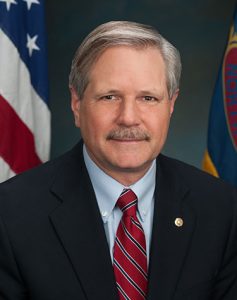
Sen. John Hoeven
U.S. Sen. John Hoeven (R-ND) on Nov. 30 helped jumpstart a new round of UpskillingND, a recently formed collaboration between the North Dakota State College of Science (NDSCS), Microsoft, and TrainND Southeast to provide free technical training and certification that supports job seekers looking to build their skills for in-demand careers.
The NDSCS received a $50,000 Coronavirus Aid, Recovery and Economic Security (CARES) Act grant, with matching funds provided by Microsoft, to establish UpskillingND, which launched in October and offers free courses to four cohorts of students through March 31, 2021.
“Our state needs hard-working, motivated individuals to support the growth of our state’s tech sector, and while our nation continues to combat this pandemic, we appreciate the efforts of NDSCS, Microsoft, and TrainND to provide this opportunity for technical training to those who are driven to pursue such a career,” Sen. Hoeven said.
The senator said that collaborative effort “will not only help reduce the economic impacts of COVID-19 in the near-term, it will help build on our long-standing efforts to establish the Red River Valley as a hub of tech entrepreneurship.”
Sen. Hoeven also highlighted his efforts to position the region as a nationally recognized hub for tech entrepreneurship.
On Capitol Hill, for instance, Sen. Hoeven is working to advance the bipartisan Support Our Start-Ups Act, S. 2841, which he introduced in November 2019 with bill sponsor U.S. Sen. Tammy Baldwin (D-WI) to enable entrepreneurs to deduct more of their business start-up costs and to invest more into their operations sooner, according to his office.
Sen. Hoeven in February 2019 also introduced the bipartisan Portable Benefits for Independent Workers Pilot Program Act, S. 541, with bill sponsor U.S. Sen. Mark Warner (D-VA). That legislation would authorize grant awards on a competitive basis to states, local governments or nonprofit organizations to support broad innovation and experimentation with respect to portable benefits, which are work-related benefits that are provided to workers who are not traditional full-time employees in a manner that allows the worker to maintain the benefits upon changing jobs, according to the congressional record bill summary.
Both measures remain under consideration in the U.S. Senate.



